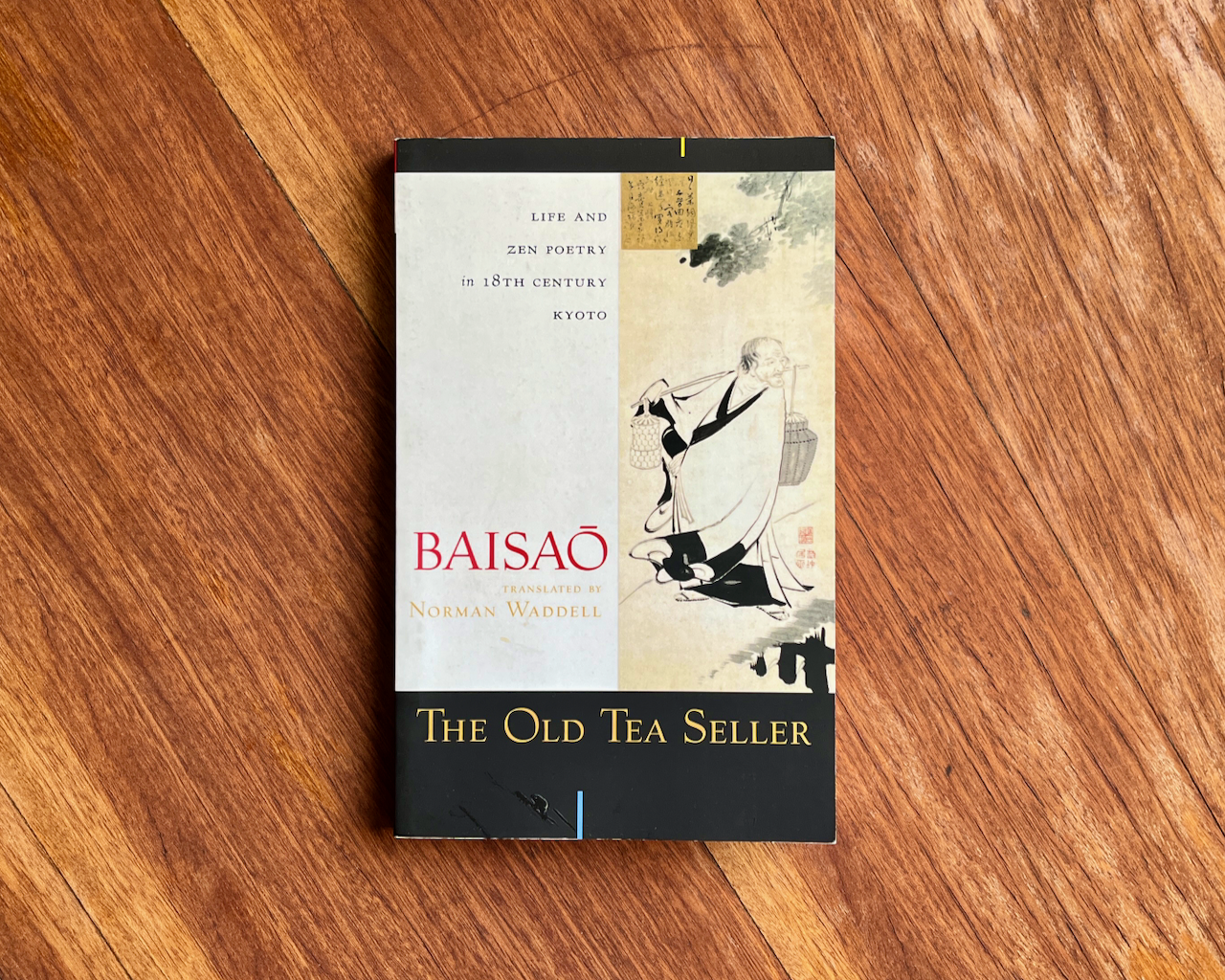The Old Tea Seller: Life and Zen Poetry in 18th Century Kyoto
Born in Kyushu 九州, in a castle town in Hizen 肥前, Haisuke. Baisao was the name he was known for later in his life. His monk name was Gekkai Gensho.

A book translated by Norman Waddell, born in Washington and residing in Kyoto, Japan. Translator of sacred texts on Japanese Zen Buddism.
Overview
The book has two distinct parts, a biography of Baisao 売茶翁, from his origins in Haisuke to his life in Kyoto, where he would later take the name Baisao. The author uses a variety of sources, including correspondence, poems and memoirs, to conclude what appears to be the first biography written about Baisao. The second part is a translation of Baisao's work based on the compilation by Fukuyama Chogan 福山朝丸, a scholar from Manpukuji Temple 萬福寺, who compiled Baisao's literary work, including a chronology of his life, published in 1934.
Born in Kyushu 九州, in a castle town in Hizen 肥前, Haisuke. Baisao was the name he was known for later in his life. His monk name was Gekkai Gensho. Baisao took priesthood at the newly established school of Zen that would become the Obaku Zen school at 11 years of age.
At some point in his life, he left the temple and moved to Kyoto 京都, where he sold tea in a shop or sometimes around town and other scenic places. Through his shop and way of life, he became acquainted with many important literary, artistic and scholarly figures of the time. These figures were fundamental to the cultural development of their time.
Baisao sold tea through donations and used leaf tea he simmered in a teapot. Contrasting with powdered tea similar to Matcha 抹茶 or brick tea grounded and whisked, the usual method at that time. It is thought to have met at some point Nagatani Souen 永谷宗円 and used his newly developed Sencha 煎茶 at his shop.
His brewing style, uncommon at the time and his eccentric, spiritual and artistic inclination had the after-effect of creating a tea culture revolution. His influence can be observed in the Senchado 煎茶道, the way of tea using Sencha leaves and the connections with the literati of the time, some of which formed what was known later on as the Bunjin 文人.
A great reading experience
The book is a great reading experience. The first part follows Baisao through his youth to his death in 1763. It follows the different eras of Baisao's life as a priest, wanderer, sometime teacher, tea seller and eccentric figure of his time. Marked by poverty, integrity and appreciation, his life rhythm is felt throughout the entire biography.
The second part changes format completely, as it is a translation of literary work by Baisao. It is invaluable to be able to read his work compiled in one book. To me, the first part does an excellent job of a biography, informing of Baisao's life and his struggles in everyday life. The second one is a more creative and reflective register, which I enjoyed. I will end by sharing a couple of Baisao poems to let those express the depth of the second part of this book.
A beautiful poem that illustrates Baisao's life:
Composed in a Dream
Pain and poverty
poverty and pain
life stripped to bone
absolute nothingness
only one thing left
a bright cold moon
in the midnight window
illumining a Zen mind
on its homeward way
And one of my favourites:
Twelve impromptu Poems IX
Going far away to China
to seek the sacred shoots
Old Eisai brought them back
sowed them in our land.
Uji tea has a taste infused
with Nature’s own essence
a pity folks only prattle
about its color and scent.
About the author's works
Norman Waddell is an author and translator born in Washing in 1940. He was a professor at Otani University in Kyoto 京都. He translated to English many Zen Buddhism books, including works by Hakuin, D.T. Suzuki and Dogen.
References
Baisa-ō, and Norman Waddell. The Old Tea Seller: Baisaō: Life and Zen Poetry in 18th Century Kyoto. Counterpoint : Distributed by Publishers Group West, 2008.
“The Old Tea Seller.” Counterpoint Press, 23 Sept. 2015, https://www.counterpointpress.com/books/the-old-tea-seller/(https://www.counterpointpress.com/books/the-old-tea-seller/).
Graham, Patricia J. Documents and Monuments in the History of the Sencha Ceremony in Japan. no. 26, Mar. 1993.
